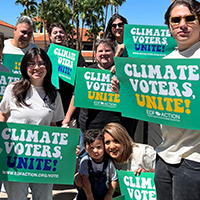How States Are Restricting Voter’s Rights and What We Can Do
By Carol Andress
Voter turnout hit record numbers in 2020 due to measures that states adopted to facilitate voting during the pandemic. Still, only 2 of every 3 eligible voters cast their vote and our voter turnout continues to trail behind other developed countries by a considerable distance. This partly explains why it’s so hard to get politicians to enact widely popular measures such as support for clean energy or making polluters pay for the harm that their actions impose on communities. When voters are silent, concerns about clean air and water can be ignored in favor of big polluter interests that benefit from outsized influence.
Sadly, instead of building on the lessons from 2020 on how to boost voter turnout to ensure that we have leaders who support a healthy and equitable future, lawmakers in dozens of states are pursuing ways to suppress the vote of the people who are most harmed by big-polluter-driven policies.
What Are States Doing to Restrict Voters
Right now our freedom to vote is being attacked all across the country. Several states, including Georgia, Arizona, Texas, and Florida have adopted measures to make it more difficult to vote and are actively pursuing more. Georgia’s law will make it harder to cast an absentee ballot, limit early voting days and overhaul how elections are run. Among other things, the law limits drop boxes, requires different forms of ID for absentee voting, and bans handing food and drinks to voters waiting in line. Additional provisions give greater control over elections to Georgia’s majority party.
Arizona, Texas, and Florida lawmakers are also altering the way people can vote, with proposals for additional ID requirements, restrictions on drop boxes, and cuts to private funding for local election offices. Arizona Governor Ducey signed a bill in early May that could remove more than 100,000 infrequent mail voters from the list to receive ballots by mail. All of these states, with their growing and increasingly diverse populations, play a substantial role in the outcome of presidential contests. These voter restrictions will make it harder for everyone, particularly the new majority, to have an equal say in our democracy.
To put it into numbers: In May, The Brennan Center found that lawmakers have introduced at least 389 restrictive bills in 48 states in the 2021 legislative sessions. Of these bills, 61 bills with restrictive provisions are moving through 18 state legislatures, 31 of them have passed one chamber, while another 30 have had some sort of committee action. Overall, 14 states have enacted 22 new laws that restrict access to the vote, including Georgia’s egregious voter suppression law.
What Can We Do?
While attacks on voting rights are scary, it is important that we keep fighting for access to the ballot box and our democracy. The good news is that Congress could actually start to make a difference now by passing the For the People Act. This bill remains one of the most consequential people-empowering pieces of legislation since the Voting Rights Act of 1965 and is supported by voters no matter their party because of its nonpartisan/bipartisan origins. It incorporates key measures that we urgently need, including automatic voter registration, a national guarantee of free and fair elections, an end to partisan gerrymandering, and a much-needed overhaul of federal ethics rules. The For the People Act would be a critical step to counter the many voter suppression bills that are currently being considered by state legislatures. In addition, Congress must also pass the John Lewis Voting Rights Advancement Act, to restore the full protections of the Voting Rights Act.
These reforms are popular with the public — Republicans, Democrats and Independents all supported the bill. Without these reforms it will be harder to make real and lasting climate progress. Our voices at the ballot box and in our democracy means clearer water, healthier air, and a thriving planet. This is especially critical for communities of color, many of which experience environmental injustices on a daily basis. Environmental and racial equity cannot be fully achieved without a system in which all Americans have the means to advocate for themselves and exercise their political power.We are also not alone in this. There is an extensive list of advocacy groups and elected officials who support this bill including President Biden and Vice President Harris. Both have been pushing for better voting rights laws as restrictions mount. President Biden used his first address to Congress and the 100th anniversary of Tulsa’s race massacre to make a plea for sweeping legislation in Congress to protect the right to vote. VP Harris will also be working with organizations and the private sector to help strengthen and uplift these efforts.
In his Tulsa speech, Biden also discussed voting rights — says he’ll “fight like heck” to pass S.1 (and is assigning VP Harris to be on that issue), told voting rights groups to “redouble” their efforts, and said June should be “a month of action” on voting on Capitol Hill
— Grace Panetta (@grace_panetta) June 1, 2021
This support is great because all of this is likely to come to a head fairly soon. Senate Majority Leader Chuck Schumer (D-NY) announced that he is bringing S1, the For the People Act, to the floor next week. This bill needs all the support it can get.
So, What Can You Do? Join us at EDF Action as we fight for voting rights and support our efforts to get the For the People Act passed. Get informed by watching the video below where a panel of experts discuss voting rights, suppression efforts and their intersection with environmental issues and sign this petition to tell your Senators to support the For the People Act.



